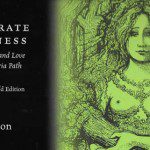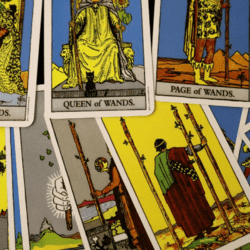In my own path of spiritual seeking, I frequently reflect on my religion, my spirituality. I wonder if the label “Pagan” still suits me or if I’m something else. I also think a lot about my own theology and how that has shifted over time; I used to be more of a polytheist, and now I’m more of a pantheist/archetypist. I think about the mysteries beneath the surface of the world, and about the things that I don’t know…that I can’t know…but that doesn’t stop me from wondering. And I occasionally wonder what drew me to this particular spiritual path in the first place.

I never was really raised Christian, or at least, not a church-going Christian. My parents had both been raised Christian, and there was kind of an assumption from my classmates, teachers, relatives, and people I encountered of everyone following the dominant religion. But, my parents were both into kind of New-Age-y stuff…energy healing, psychic powers, Edgar Cayce, Atlantis, channeling, Reiki, psychic abilities, that sort of thing. They also raised me on a diet of science fiction and fantasy.
So I guess you could say I grew up exploring a lot of the mysteries, the questions, the secrets beneath. My parents raised me to question the status quo. They didn’t necessarily raise me to be Pagan, but they did raise me to not be satisfied with the dominant culture.
For a while, I labeled myself as an atheist. At the time, what I meant by that was “not Christian.” That didn’t last too long because I began having intense experiences of a particular angel/goddess. I have called her the Angel, Lady in the Blue Light, or Goddess of the Water Temple. Moonlight, water, nighttime stars…all those seemed connected to her. I began having visions, dreams. I talked to her at night and I felt her whispering back to me.
In middle school and high school I was bullied, and the connection to this goddess is part of what kept me from considering suicide. My spiritual connection gave me strength, even though I didn’t know who she was or what she was.
Being Different
I think a lot of Pagans will probably resonate with this: It’s really hard for me to separate my religious leanings with how different I felt from everyone else around me. One of the strongest sensations I had, growing up, was that I didn’t fit in with the crowd. It wasn’t just a religious difference, it was a social difference. I didn’t believe in the Christian God–or at least, I didn’t believe in the Christian dogma as I had learned it via osmosis from everyone around me. Moreso than that, I didn’t believe in how my classmates were forced to attend religious services, or do religious education. I didn’t like how people were indoctrinated in that way.
More and more, I value how my parents raised me to have an open mind.
If you’re familiar with the Myers-Briggs personality test, I usually test out as an INTJ, and I’ve read that INTJs value independence in others, and that resonates a lot for me. When I was growing up, and now as an adult, what has frustrated me more than anything else about the dominant religions–particularly Christianity–is the social controls. I couldn’t have articulated it as well as a kid, but I felt that “squeeze,” that pressure to toe the line, to be what the people in charge want you to be. Now I see it threaded through every aspect of society. Control over our bodies, over our sexuality, over our sexual health, through environmental pollution and waste, through capitalism, through discrimination and racism and homophobia.
When I discovered there was this whole modern Pagan movement I was about fourteen, and not long after that I began calling myself a Pagan. At the time, I wanted to be a druid, but being a teen in rural southwest Wisconsin before the internet had picked up steam, I had no real access to the Pagan community, other than the Pagans I met while working at the Renaissance Faire.
Cultural Fringe
As a teenager I hung out (and later worked at) the Bristol Renaissance Faire. In college I hung out with Goths, and began attending science-fiction/fantasy conventions. I slowly started connecting with other Pagans and eventually joined a Pagan group in my 20’s. What’s clear to me, as I look back, is how connected my spirituality is to being on the fringes of society.
Whenever I think, “Am I still a Pagan? Does that define me?” I look around me, I look at the dominant culture and the other major religions. And I think about the Pagan community. And–even with the frustrations within the Pagan community, the divisiveness, the drama, and the instances of horrifically crappy leadership and even abusive leaders–Paganism’s the closest I have to home. It’s where there are others like me who question things, who don’t just buy into the status quo. Who look beneath, who seek the mysteries themselves instead of letting someone else tell them, “This is what you must believe.”
It’s not to say there aren’t Pagans looking for leadership and guidance. There are plenty of Pagans out there willing to follow any strong leader–even an abusive one. But I’d say that in general, most Pagans are still more likely to question things than most people in the dominant culture.
But What is Paganism?
Sometimes I get stuck in the spiral of, “But what is Paganism?” There are so many paths under the Pagan umbrella that I can’t even say, “My Pagan values,” and have that be at all accurate because we aren’t a monoculture. I could say, “My values, as a Pagan,” but even that is a bit vague.
I can tell you what I’m not. I’m not Christian, Muslim, or Jewish. I’m not Buddhist. I’m not Hindu. I’m not “spiritual but not religious.” I’m Pagan.
The word Witch hasn’t really ever called to me, but that’s in part because the word Witch is now tied into Wicca, which isn’t my spiritual path. Druid is perhaps a bit closer, since I find I have a strong connection to the Celtic myths and language, but I’m more interested in the Druid as a role, not as a path. The local Druid was the priest, the poet, the oracle, the star observer, the keeper of the mysteries and the leader of rituals. Druidism wasn’t a path, back in the day, it was a job. Similarly, I find myself called to the word Shaman to define my path, but again, it’s more of a flavor of a job title. The word Shaman, anthropologically, tends to refer to the person responsible for the spiritual well-being of a tribal culture, and Shamanism tends to imply ecstatic trance practices as well. I see the job of the Shaman and the Druid to be pretty closely in alignment, though the Shaman has perhaps a more primal connotation which is probably why it draws me. But the word Shaman is appropriated from the Siberian tribes, so that becomes problematic.
So What Am I?
I’m a mystic–one who seeks and connects directly to the divine. I’m a seeker, I’m a questioner, I’m someone who always wants to explore and know more about the world and how things work. For me that could be exploring trance technique in ritual, reading an article on particle physics, or engaging in deep personal work to face my own shadows. My spiritual practice is ecstatic and embodied using trance practices to connect to the divine, and to help people connect to their deep selves.
In fact, I can’t even really separate my own spiritual calling and divine connection from my calling as a priestess/minister/leader/druid/shaman. For me, I wouldn’t be true to my faith and my belief if I weren’t helping to create community, to teach skills, to mentor and lead, to help make the world a better place. This is also where my spirituality connects to my activism. I wouldn’t be living my spiritual values if I weren’t fighting for equality, for justice, fighting for a healthy relationship with our environment, fighting for the rights of people of color, for people of diverse genders and diverse sexualities…for reproductive health, for my own body sovereignty and that of other women, for the right to choose.
All those things are core to my faith, and I believe that they are a strong part of the overarching Pagan community. While many Pagans unfortunately are still steeped in homophobic, transphobic, and racist culture (and often unaware of how systemic this is)
Faith
I have to admit, talking about my faith and using that word “faith” sometimes gives me a sensation of squick in my gut. What I mean is, having grown up in a dominantly Christian culture, whenever I hear people talking about “faith,” I tend to assume they’re talking about Jesus and Christianity, and that makes me instantly think of dogma, control, and bigotry. Now–I’m not saying in any way that all Christians are bad. I’m talking perhaps more about that fundamentalist aspect of Christianity that scares me.
And I suppose that’s one of the problems with any word. Pagan, Christian; there’s what the word is supposed to mean, and then there’s the connotation, the “brand” image based on the experiences we’ve had with that word. I’ve known a few really amazing, open-minded Christians that I call friends. And I’ve known a lot of controlling, misogynistic, homophobic, poor-shaming, sex-shaming Christians. And you can’t attend a Pagan gathering without hearing about the discrimination some Pagan has faced from the dominant religions.
I was lucky in many ways; by the time I was “out” as a Pagan, I was mostly around people who were accepting, or at least tolerant. And I’ve spent most of my adult life on the fringes hanging out with Ren Faire and sci-fi/fantasy geeks, other Pagans, and generally with liberal and open-minded folks.
Am I a Hypocrite?
This past weekend I had the opportunity to think a lot about my own assumptions, though. I went to the bridal shower for the fiance of one of my family members. The bride’s family is Wells Lutheran, and they really don’t like the groom. He’s liberal, not exactly Pagan but more “spiritual but not religious.” There’s an atmosphere of control and sex shaming. People are expected to wait for marriage to have sex. There’s pressure for an expensive wedding, and the parents are paying for a good chunk of it, but that also gives them control over the wedding. The couple had to attend pre-marital counseling via the church where they were admonished to not have sex. To put their relationship in God’s hands. The couple is struggling, financially, to pay for the wedding, and they are concerned that her parents will expect her to not live with her fiance in the final months up til the wedding, but they only have one car and can’t afford two apartments.
Everyone at the bridal shower was nice enough, but I kind of blinked in shock to discover that the gift bags/favors given out included a small stone cross that said, “Be Joyful in hope, patient in affliction, faithful in prayer,” Romans 12:12, and the bags had a sticker with a quote, “God knows you! His thoughts of you outnumber the sand on the shore,” Max Lucado.
I felt that squirmy, uncomfortable, squicked-out sensation in my gut, and I had to explore it, think about it. Because that’s who I am.
Why did this make me uncomfortable? Why is it that Christian quotes and crosses feel smarmy and controlling to me, whereas Pagan quotes or devotional items inspire me?
I was watching a TV show where one character is a devout Catholic. On her dresser she has a cross, a rosary, images of Jesus, and she goes for her rosary to pray, and I find myself squirming again. And I thought, if that was an image of Sekhmet or Lugh, if those were prayer beads devoted to Freyja or Aphrodite or Brigid or the Horned God, would I have an issue with this?
And I wondered, if I get squicked out at Christian examples of faith and devotion, am I a hypocrite because I don’t have a problem when Pagans do this?
Faith, Freedom, and Control
I realize that so much of my issue is about that core issue of control. Of bigotry. My issue with the Christian prayers and dogma is the evangelism, the proselytizing, the assumption that not only is theirs the only correct path, but that I’m somehow bad or evil for following my own path. Pagans, we squabble, but ultimately even when we think we’re right, we also acknowledge someone’s right to follow their own path so long as they aren’t hurting anyone.
And maybe that’s the essence of why I’m a Pagan and why that’s the label I use–freedom. I want each person to have the freedom to choose their own path. I want people to have the freedom to question, to seek beneath, to experience their own divine rapture on their own without having dogma crammed down their throat. I want people to have sovereignty over their own hearts and minds and bodies.
This is why I can’t really separate my faith and spiritual path from my work as a Pagan ritualist and teacher and my calling to serve, and why I can’t really separate it from my politics and my activism. As long as there are bigots, as long as there is misogyny and racism, as long as there are people fighting for the right to take away my own choices when it comes to contraception and abortion–and with the other hand, fighting to make it harder for the poor to make enough of a living to raise a child at all–as long as these issues exist, I’ll be fighting for freedom and justice and equality.
Future of Paganism
I believe the Pagan community is going to grow more diverse in the coming years and decades, but I also believe that there will be more people identifying as Pagans, or in that spectrum between Pagan and “spiritual but not religious.” I think that more people are going to hear that call for freedom, that call to question things and not just accept what they were told is the “right” thing to do.
Sometimes, asking all these questions causes division. There are pantheists and polytheist and atheists in the Pagan ranks, and we often disagree with each other. But what I think most Pagans share is the inherent worth and dignity of each human being. I think many of us also share that sense of questioning, of looking beneath the surface. Of not just doing something because “the authority” told us to.
What do you believe? What is the core of your faith?

Patheos Pagan on Facebook.

the Agora on Facebook
Seeking the Grail is published on monthly on the third Monday. Subscribe via RSS or e-mail!
Please use the links to the right to keep on top of activities here on the Agora as well as across the entire Patheos Pagan channel.

















